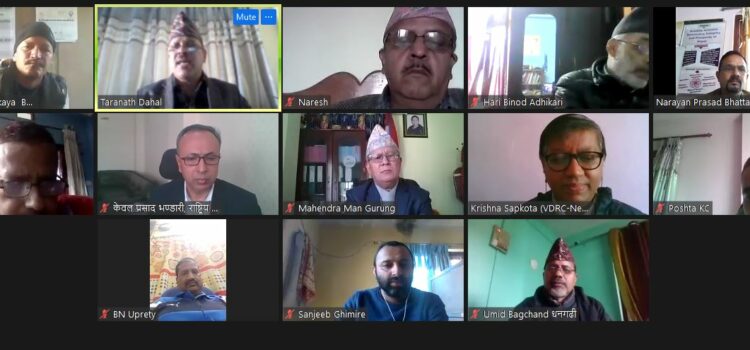Freedom Forum organized a virtual dialogue on ‘Nepal’s’ Participation in Open Government Partnership (OGP), Status and Readiness’ on November 30. The main objective of the event was to discuss the status of readiness and reflection on OGP from both CSOs and government side.
This discussion was the part of OGP initiative led by FF. Series of thematic discussions were held surrounding OGP themes and the nationwide stakeholders mapping of working CSOs in different OGP themes was also completed. The representatives of CSOs from across the country, government officials (NPC and NIC), OGP and governance experts and practitioners were major participants in the event.
Thematic reflections and status along with readiness were expressed by CSOs on different thematic areas. The CSOs felt the need of effective monitoring of right to information in order to ensure the environment and practices of open government partnership. The RTI activists are under immense pressure while requesting information from public agency. Similarly, citizen engagement should work as a bridge for different parameters of OGP. Through mapping, it could be made the agenda and work development forwarded in reference to OGP.
Understanding on OGP with reference to gender is major concern in Nepal. The linkage of gender and OGP can be shown in different countries with research but in our context there is absence in data and information. Sustainable Development Goal 16 and OGP could have a link. Establishment of relations between OGP and SDG could be a useful technique to accelerate the practices of open government to bring together the priorities for governments and citizens at different levels, the discussion stressed.
Open Parliament is another major component of OGP. In all three tiers of government, the citizen engagement and collaboration in line with parliament and in law making process plays vital role. Environment has been made to move forward, now government (legislative body) should be responsible in this regards.
In case of Fiscal Transparency, localizing fiscal openness is must to facilitate citizen engagement in fiscal policy formulation and execution at three tiers of governments in the new political and administrative setups of federal Nepal.
In the global context, Open Data and its management has become a key issue. The use of technology and the data produced from the technology should be accessible and transparent so that the public have the reach and access of those information. As per the open data principles, data should be open, standardized and used in multi-dimensional roles. Standardized data is the need in Nepal. Similarly, case of data management, the government has developed mechanism but the sharing device is not there. The role of private sector is more critical and therefore the collaboration between government and private sectors would be effective for open data management.
In regards to preparedness of OGP Action Plan, the mapping FF has done so far is the best practices in this process. Being a part of this OGP movement, CSO felt that although Nepal was eligible to become a member, they were not chosen due to different reasons. Now, Nepal is in the phase of federalism where CSOs need to focus more on reaching to sub-national level.
On behalf of focal organization, Secretary at National Planning Commission, Kewal Bhandari, highlighted the benefit of joining OGP and the trust it creates among citizen and government as partners.
Similarly, Chief Information Commissioner at National Information Commission, Mahendra Man Gurung, also advocated for pushing the process for Nepal to join OGP as the country has met all requirements for some years. Both speakers showed their commitment to forward the agenda at government level to push the OGP joining process from their respective institutions. For this, they also hinted at making a stakeholder committee along with government representation for better performance to push this agenda into reality.
On the occasion, former chief secretary of Nepal government, Somlal Subedi, shared that political transition is the major reason that Nepal was not able to join OGP. According to him, political decentralization, and grassroots level pressure support OGP. We should learn from a quote: More accountability less corruption and less accountability more corruption, Subedi added.
The virtual meeting was moderated by Sanjeeb Ghimire and Taranath Dahal. It was held as part of the program ‘Civil Society Mutual Accountability Project (CS: MAP)’ with the support of FHI 360 which had attendance of 70 participants. Out of 70 participants, there were 12 females in the event.

